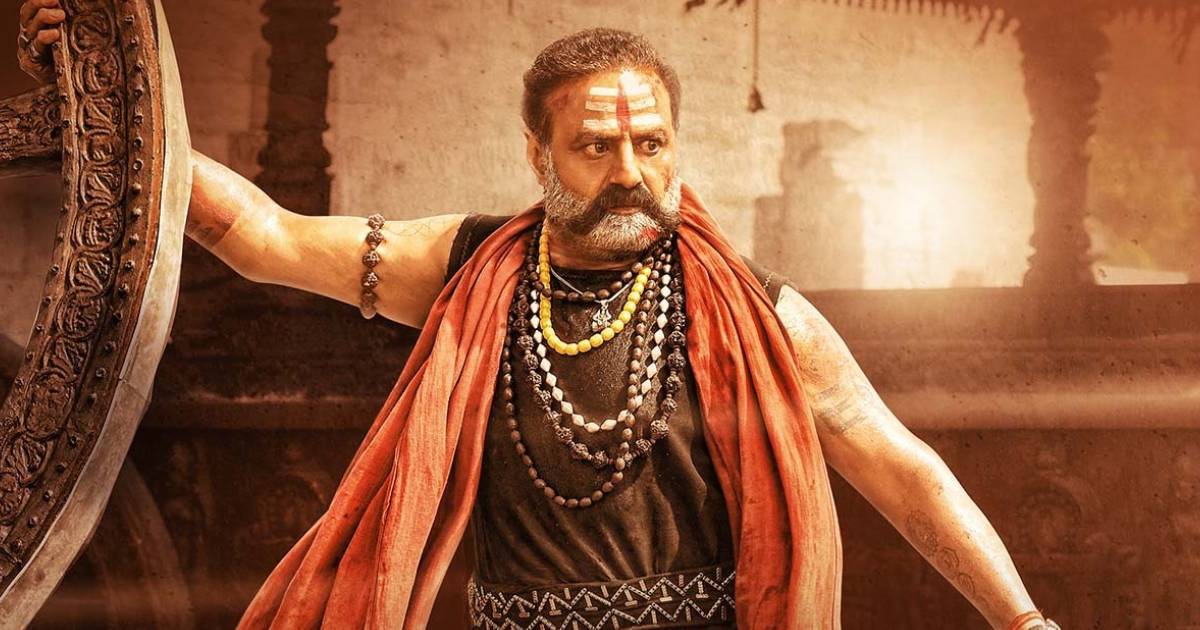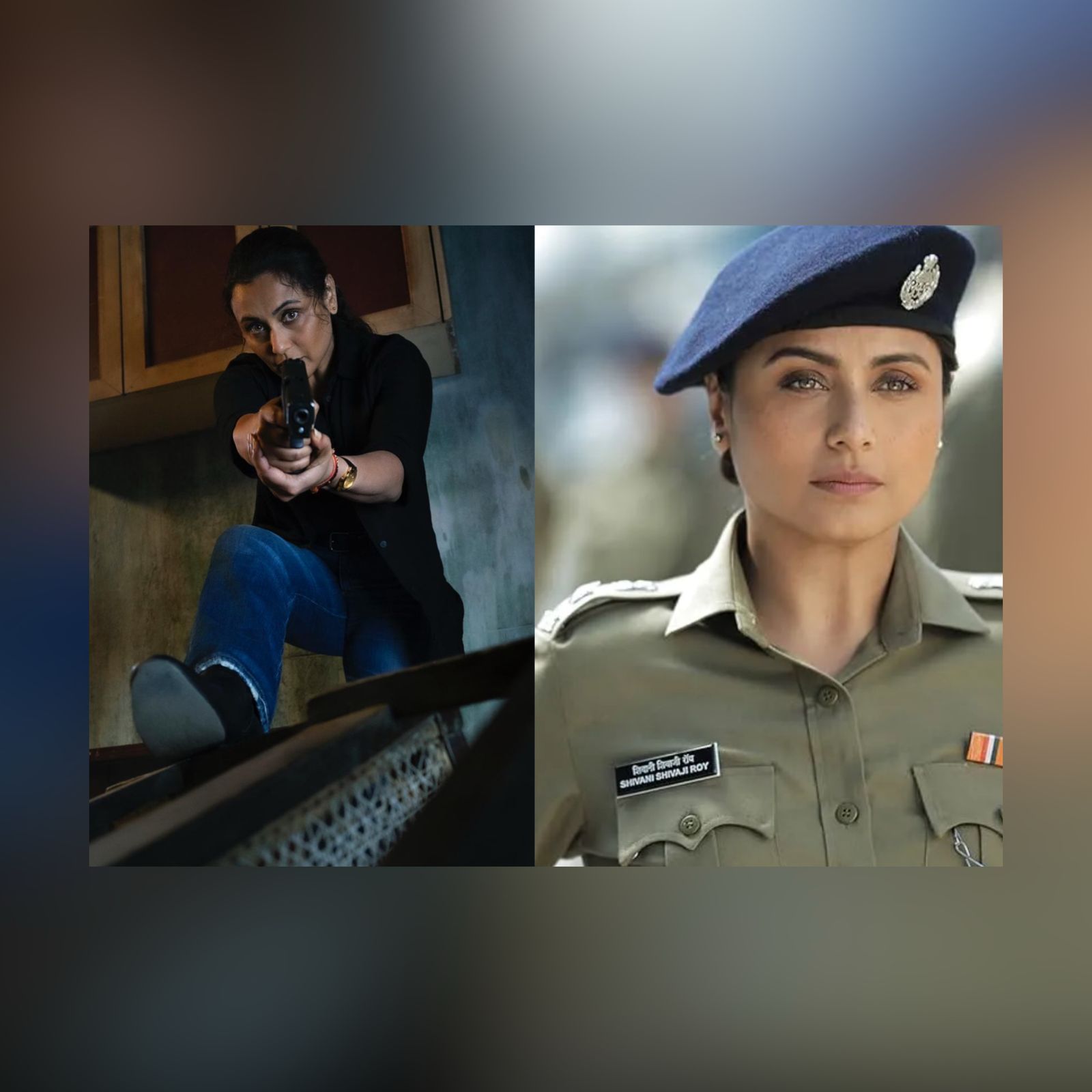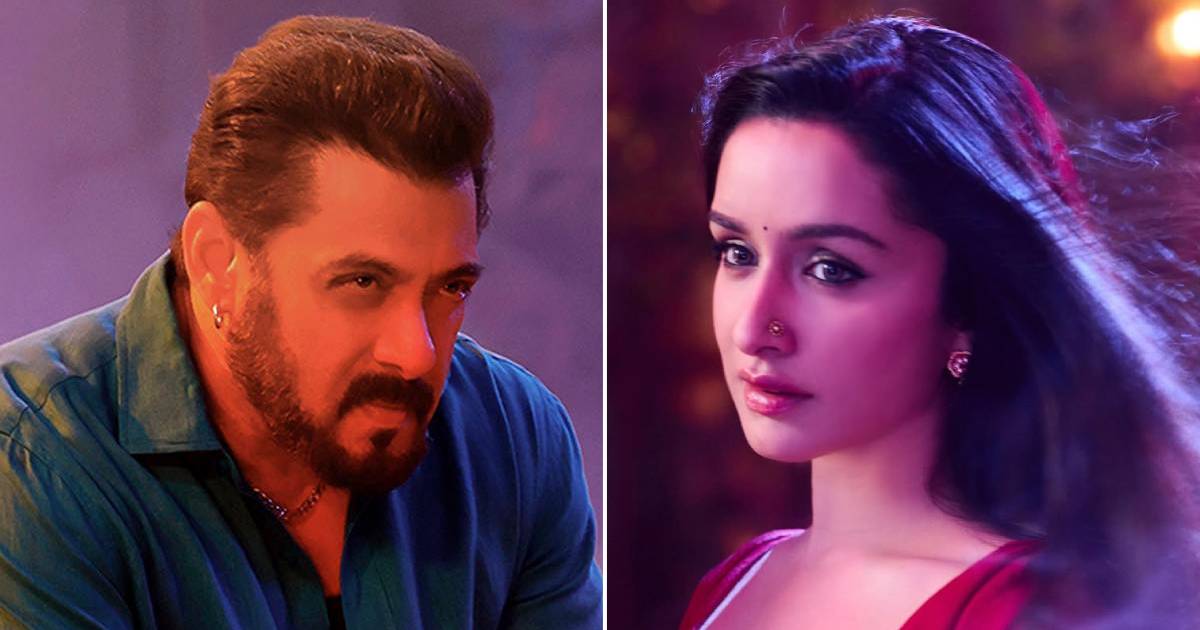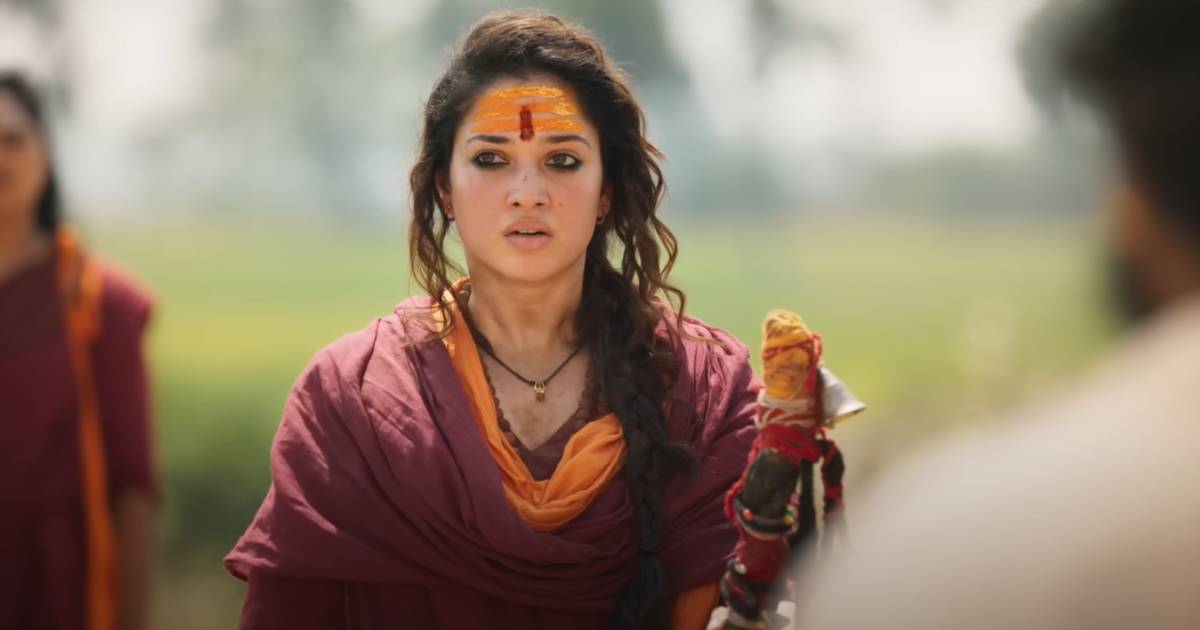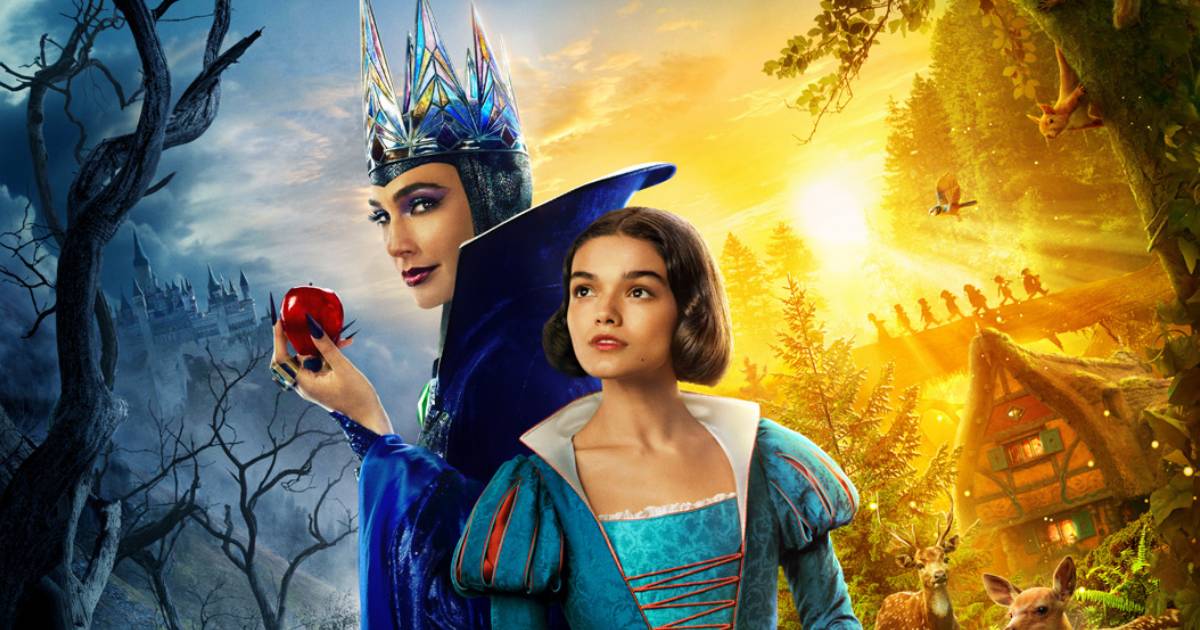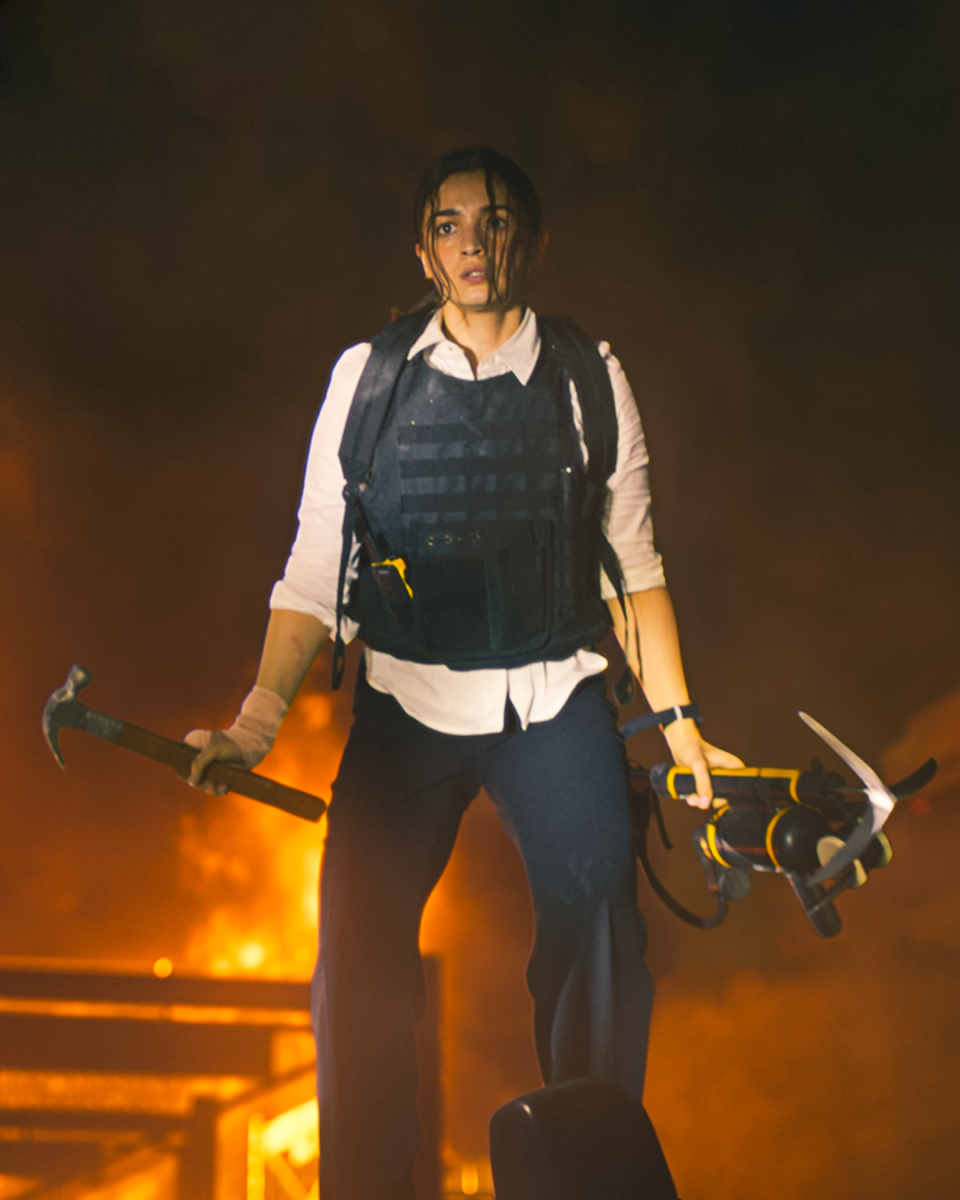
Ek hazaaron nahi, Alia Bhatt’s Satya is one in a million behna – Beyond Bollywood
With scant regard for a nation’s law and order, anarchic yet gripping—Vasan Bala’s action thriller is hard to miss. Alia Bhatt and Manoj Pahwa deliver strong performances.
Rating: ⭐️⭐️⭐️💫 (3.5 / 5)
By Mayur Lookhar
As they ascend the stairs to their home, the elder sister presses her little brother to reveal the names of the bully classmates. The boy urges his sister to drop it, but she remains determined to teach them a lesson. The bullies are named Amrish, Jeevan, and possibly Ranjeet. If you didn’t know earlier, now you do—this is a Vasan Bala film, where tributes are in order for legendary heroes as well as iconic villains.
Returning to the opening scene, the children reach their door, and the girl unlocks it. In the next moment, a man is standing in the balcony facing the kids. No words are spoken, but in that instant, he apologizes to his daughter, Satyabhama (Aashna Vaishnav), before falling to his death. A child herself, Satyabhama aka Satya understands what has just transpired and quickly covers her brother’s eyes. A stunned silence envelops the scene as the title plays out. If this doesn’t grip you, nothing will.
Here is a little girl who showed no emotion then. Her brother is her entire world, and protecting him at all costs is her only motto in life. Imagine if any harm came to Ankur—what would she do? Even if the gods stood in her way, Satya (Alia Bhatt) wouldn’t spare them either.

In the present day, Ankur (Vedang Raina) faces a death penalty on a fictional Southeast Asia island named Hanshi Dao. He is locked in an impenetrable jail. With her brother’s life on the line, imagine the carnage this diminutive yet resolute woman will unleash. “Each year, you wear my rakhi, so it’s my duty to protect you,” the sister proclaims. Phew, writer Debashish Irengbam, and writer-director Vasan Bala have turned Raksha Bandhan upside down. But nowhere is it written that protecting a sibling is solely a brother’s responsibility. It’s only fitting that a Jigra is released during the festival of Navratri.

A save-sibling story that partly recreates the iconic song Phoolon Ka Taaro Ka naturally invites comparisons with Dev Anand’s cult classic Hare Rama Hare Krishna (1971). But does a gender reversal make Jigra an original film? Truth be told, there’s more than just a gender reversal here, as Vasan Bala and producer Karan Johar have crafted a new world that is a country mile apart from the Dev Anand classic. The latter served as a fine social commentary on the growing drug menace. In Jigra, however, morality is blurred as Satya is prepared to disrupt law and order in another country and create anarchy. Phew, isn’t that bad PR for Indian cinema? Vasan Bala is mindful of raising this morality debate in the film, but as Satya bluntly puts it, “Main koi achhi insaan nahi hoon” (I’m not a good person). The distinction between moral and immoral becomes immaterial as Satya is even willing to blow up a nation to save her brother.
This devil-may-care attitude will polarize views, but it is addressed by creating a fictional country inhabited largely by people of Mongoloid features, alongside desi faces in authoritative positions. The main obstacle to Satya’s Herculean task is state prison Officer-In-Charge Hans Raj Landa (Vivek Gomber). The Middle East and certain Southeast Asia countries like Singapore maintain a zero-tolerance policy towards drug trafficking. However, Bala wisely opts to create a fictional nation, ensuring no Southeast Asia countries feel offended.
Hanshi Dao appears to be a Communist island, and given its strained relations with neighbouring countries, one can presume it is on par with the Red Dragon. Given India’s low conviction rate, we are in no position to criticize laws in foreign countries. However, when you read about bizarre death penalties awarded to Indians, as we saw in Qatar last year, you do wonder whether the ‘right to defend’ is being upheld in these nations.

Over the years, Dharma Productions hasn’t shied away from experimenting. The collaboration with Vasan Bala, whose films is generally celebrated at film festivals, isn’t entirely unexpected. A few months ago, Dharma produced India’s most violent film, Kill (2024). There’s no bloodbath in Jigra. It stays true to its name, showcasing the jigra (bravery) of the diminutive woman, Satya. Bala’s stories may not necessarily be novel, but he brings his own unique flavour to them, often featuring a sense of nostalgia. Jigra is a well-crafted film, standing out for its quality writing and top-notch production values, particularly Swapnil Sonawane’s exemplary cinematography, Achint Thakkar’s gripping music, and a terrific background score. From Agneepath to Zanjeer, Bala pays homage to cinematic classics. The most nostalgic moment occurs when the tunes of Yaari Hai Imaan play as Bhatia (Manoj Pahwa) storms in like Sher Khan to help Satya. In Bhatia’s final scene, the lyrical version transitions to a somber instrumental (violin) rendition, which is simply moving. Although Jigra tells a simple tale, Bala’s creative and technical expertise keeps the viewer engaged for its 155 minutes.

Alia Bhatt has demonstrated her versatility in films like Udta Punjab (2016), Gully Boy (2019), and Gangubai Kathiawadi (2022), which is perhaps her most avant-garde work. But is she cut out for action? Honestly, we had our doubts, but Jigra proves that action is more about attitude than physique. Bhatt intimidated us as Gangubai, but she’s perhaps even more dangerous as Satya.
A rough childhood has made Satya tough as nails. Bala leaves it to the viewer to imagine how Satya became the most trusted right hand of powerful businessman Mehtani (Akashdeep Sabir). She is the lone voice of reason around him, as shown when she counsels his son, who is ready to call off his arranged marriage and run away with his poor pregnant girlfriend. “Think practically, your father won’t harm you, but he will kill your girlfriend and the unborn child,” Satya bluntly tells Jr. Mehtani. Her loyalty to her boss is unquestionable, as reflected in her words: “We staff are on duty 24×7.” But in a brutal world, it’s often the loyal pawn that gets sacrificed first.
Bhatt is seven years older than Vedang Raina, but she looks as young as the 24-year-old. Satya may be a helicopter parent to Ankur, but given their tough childhood, it’s natural for the elder sister to be protective of her brother. Ek hazaaron nahi, Alia Bhatt’s Satya is one in a million behna (sister). You don’t need high octane action scenes when you’re Alia Bhatt—she defeats her adversaries through sheer intensity. Bhatt shines in her maiden action role with a strong performance.

Raina made his debut with the disastrous Netflix film The Archies (2024). But one film can change our perspective. Though it may irk him at times, Ankur never seeks distance from this sibling bond—Satya is his shield. Raina moves you with his cries during the scene where he’s lashed by a foe-turned-friend inmate. His competent performance in Jigra shows that he’s here for the long run. However, his rendition of Phoolon Ka Taaro Ka wasn’t as appealing.

Manoj Pahwa is a powerhouse of talent who rarely fails to impress. In Jigra, Pahwa’s Bhatia carries a similar grievance, and without his support, Satya wouldn’t have been able to navigate the conflict in Hanshi Dao. This Bhatia is far removed from the many bureaucratic roles Pahwa has played in Office Office (satirical TV show). In Jigra, Bhatia was once a goon, but don’t underestimate him. “I’m a tiger,” he declares, and when the critical moment arrives, he roars like one. Who needs six-packs when it’s the jigra that counts? And Pahwa has plenty of it.
An Indian-origin top cop in a foreign jail demands that you don’t sound desi. So, Vivek Gomber adopts a Mongoloid-accented English. Some may find it farcical, but Gomber impresses with his intensity. Landa (Gomber) warns Ankur and company that his great-grandfather might have been Indian, but his loyalty lies with Hanshi Dao. Landa is a fierce servant and a firm believer in rules. Bala wisely avoids portraying him as a cliched cruel jailor. In truth, Landa is simply doing his job, and it would be unfair to label him a villain. Is he obsessed with rules? While one respects the laws of this fictional country, many common people around the world feel that such laws often apply more to them, while bending to suit the powerful. Extreme rules, discipline is like soap—the harder you try to grip them, the more they slip away. Gomber seizes this major career opportunity with both hands.
The final action scenes unfold amid buzzing alarm lights, followed by a sea chase at dawn. There’s no mindless action—Bala’s actors captivate with their sheer intensity. However, one might question how the initial breakout seemed far too easy for an impregnable jail.
After largely catering to a niche audience, Jigra should hopefully attract a wider audience for Vasan Bala. Yes, it displays scant regard for a nation’s law and order and may encourage certain anarchy, yet Bala’s action-thriller is hard to miss.
Watch the video review below.
Publisher: Source link
